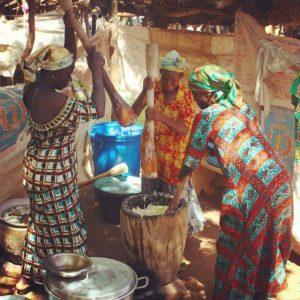
Èkó, Kí ló ṣẹlẹ sí ilé ìdánilẹ́kọ́ wa? by HerChioma “Èkó, kí ló ṣẹlẹ sí ilé ìdánilẹ́kọ́ wa ní ilé onjẹ?”
(Translation: Lagos, what happened to our kitchen?)
By HerChioma
October 2, 2025
If you grew up in Lagos in the 90s or early 2000s, you know food wasn’t just about eating it was a whole movie. Picture this: you’re sitting in the parlor, Cartoon Network on the purple Ekp phone in the corner is buzzing with “flash me” texts, and from the kitchen the smell of fried stew suddenly enters the atmosphere.
That stew was always redder than your uncle’s Peugeot 504, and the pepper? My God. It could reset your destiny if you weren’t careful. Hot Pepper Was Our Love Language Ask any Lagos kid if your mum didn’t warn you, “Ma je eleyi, ata re po ju.” If not, did you really grow up here? That hot pepper was part of our training. It toughened your tongue for life.
One spoon of the real Lagos ata dindin could humble even the proudest visitor. Forget the “spicy wings challenge”; Lagos pepper was the OG challenge. But these days? We tone it down so it can fit “fine dining standards.” Why? Meanwhile, Italians didn’t reduce their garlic, and the French didn’t hide their butter. Lagos pepper deserves its shine too. Think about it. Dodo was never just fried plantain; it was the side dish that disappeared before the food even left the kitchen. Akara and pap on Saturday mornings? Legendary.
That pap was always hot like lava, but you’d still blow it for five minutes and sip it because nothing slapped harder. And don’t forget inter-house sports; puff-puff, meat pie, and Fanta were basically official sponsors. Even Compound Gist had a soundtrack: the sizzling oil of someone frying puff-puff at the gate, kids begging, “Aunty, just one.” That was culture. Now, shawarma and pizza are running Lagos streets. No beef; they taste good.
But while other cultures polish their meals into five-star menus, we’ve left some of our best recipes stuck in plastic wraps by the roadside. Imagine going to a Lagos fine dining spot and seeing: Akara sliders with fresh pepper dip. Amala with gbegiri plated with class, not just in a buka. Ofada rice presented proudly with that signature hot sauce. Wouldn’t you order it with pride?
And so again, I ask: “Èkó, kí ló ṣẹlẹ sí ilé ìdánilẹ́kọ́ wa ní ilé onjẹ?” Because Lagos food is not “village” or “local.” It’s flavor, memory, and hustle on a plate. And if purple Ekp phones and smoky stew can live rent-free in our memories, then our recipes deserve the same respect on global tables.
“Eko, What Happened to Our Kitchen? (With Purple Ekp Phones & Pepper That Could Reset Destiny)” Lagos kitchens raised us on hot pap, smoky stew, and purple Ekp phone vibes, but are we letting those flavors fade while pizza shines?
Till next time…
Peace 🫶🏾
